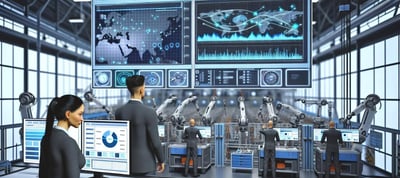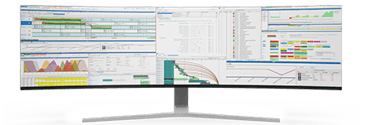Real-Time Demand Orchestration Technologies
Staying ahead of the curve requires not only efficient production processes but also seamless synchronization between demand and supply in industrial manufacturing. The role of a Production Scheduler is pivotal in ensuring this synchronization, optimizing resources, and meeting customer demands. With the advent of Real-Time Demand Orchestration Technologies, such as integration between PlanetTogether and leading ERP, SCM, and MES systems like SAP, Oracle, Microsoft, Kinaxis, and Aveva, production scheduling has reached unprecedented levels of efficiency and effectiveness.
In this blog, we'll explore the significance of these technologies, their benefits, and how they are revolutionizing industrial manufacturing.

Real-Time Demand Orchestration Technologies
Real-Time Demand Orchestration Technologies are a suite of tools and systems designed to streamline the flow of information across the production pipeline. At its core, it enables production schedulers to make informed decisions based on real-time data regarding demand, inventory levels, production capacities, and supply chain constraints.
By integrating with ERP, SCM, and MES systems, these technologies provide a comprehensive view of the entire manufacturing ecosystem, facilitating agile responses to changing market dynamics.


The Integration Advantage
The integration between PlanetTogether and leading ERP, SCM, and MES systems brings numerous advantages to production scheduling:
Seamless Data Flow: Integration ensures that relevant data flows seamlessly between different systems, eliminating the need for manual data entry and reducing the risk of errors. This ensures that production schedules are based on accurate, up-to-date information.
Holistic Visibility: By integrating with ERP systems like SAP and Oracle, production schedulers gain holistic visibility into various aspects of the manufacturing process, including inventory levels, order status, and resource availability. This visibility allows for better decision-making and resource allocation.
Enhanced Forecasting: Integration with SCM systems enables production schedulers to access real-time demand forecasts, supplier information, and market trends. This enables proactive planning and minimizes the risk of stockouts or excess inventory.
Optimized Production: Integration with MES systems provides real-time insights into production processes, including machine status, downtime, and throughput. This allows production schedulers to optimize production schedules based on actual production capabilities and constraints.

Benefits of Real-Time Demand Orchestration Technologies
The adoption of Real-Time Demand Orchestration Technologies offers a myriad of benefits for industrial manufacturing facilities:
Improved Efficiency: By automating routine tasks and providing real-time insights, these technologies enable production schedulers to optimize production schedules, reduce idle time, and maximize resource utilization.
Enhanced Agility: With access to real-time data and seamless integration between systems, production schedulers can respond swiftly to changes in demand, supply chain disruptions, or production bottlenecks, ensuring on-time delivery and customer satisfaction.
Cost Reduction: By minimizing inventory holding costs, reducing downtime, and optimizing resource allocation, Real-Time Demand Orchestration Technologies help in lowering overall operational costs, improving profitability, and maintaining competitiveness in the market.
Better Decision Making: With comprehensive visibility into the entire manufacturing ecosystem, production schedulers can make data-driven decisions regarding production planning, inventory management, and resource allocation, leading to better outcomes and improved performance metrics.
As industrial manufacturing continues to evolve, the importance of Real-Time Demand Orchestration Technologies will only grow. Advancements in artificial intelligence, machine learning, and IoT will further enhance the capabilities of these technologies, enabling predictive analytics, autonomous decision-making, and continuous optimization.
Real-Time Demand Orchestration Technologies, with integration between PlanetTogether and leading ERP, SCM, and MES systems, are revolutionizing production scheduling in industrial manufacturing. By providing seamless data flow, holistic visibility, and enhanced decision-making capabilities, these technologies empower production schedulers to optimize resources, respond agilely to changing market dynamics, and drive operational excellence.
As manufacturing facilities embrace these technologies, they will gain a competitive edge in an increasingly dynamic and demanding market landscape.
Are you ready to take your manufacturing operations to the next level? Contact us today to learn more about how PlanetTogether can help you achieve your goals and drive success in your industry.


